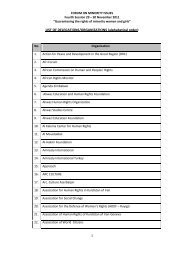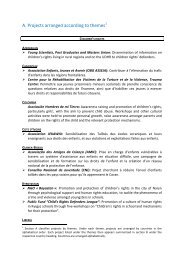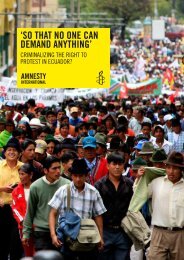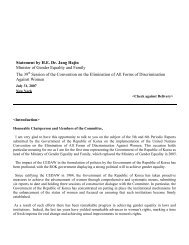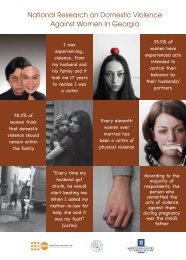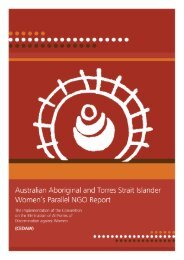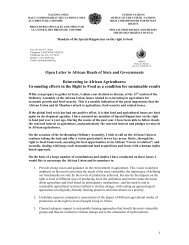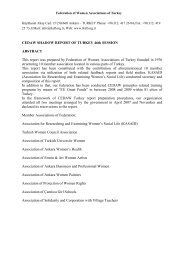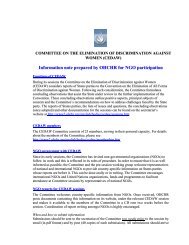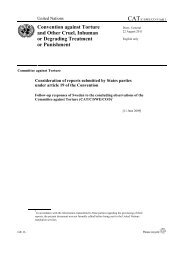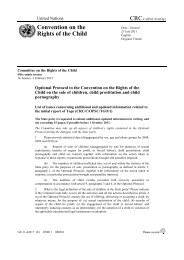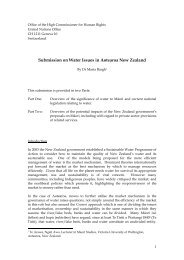Report - Office of the High Commissioner on Human Rights
Report - Office of the High Commissioner on Human Rights
Report - Office of the High Commissioner on Human Rights
- No tags were found...
You also want an ePaper? Increase the reach of your titles
YUMPU automatically turns print PDFs into web optimized ePapers that Google loves.
Palestine – Habitat Internati<strong>on</strong>al Coaliti<strong>on</strong> prepared a parallel report for <str<strong>on</strong>g>the</str<strong>on</strong>g> Committee <strong>on</strong><br />
Ec<strong>on</strong>omic, Social and Cultural <strong>Rights</strong> <strong>on</strong> <str<strong>on</strong>g>the</str<strong>on</strong>g> rights <str<strong>on</strong>g>of</str<strong>on</strong>g> <str<strong>on</strong>g>the</str<strong>on</strong>g> indigenous populati<strong>on</strong> residing within<br />
<str<strong>on</strong>g>the</str<strong>on</strong>g> green line. The main issue highlighted by <str<strong>on</strong>g>the</str<strong>on</strong>g> report c<strong>on</strong>cerned <str<strong>on</strong>g>the</str<strong>on</strong>g> unequal enjoyment <str<strong>on</strong>g>of</str<strong>on</strong>g><br />
citizenship rights, which served to limit <str<strong>on</strong>g>the</str<strong>on</strong>g> rights <str<strong>on</strong>g>of</str<strong>on</strong>g> Palestinians to use land and enjoy security<br />
<str<strong>on</strong>g>of</str<strong>on</strong>g> tenure as home-owners. There are several hundred villages in remote areas that were not<br />
depopulated by Israel, and <str<strong>on</strong>g>the</str<strong>on</strong>g> government intends to transform <str<strong>on</strong>g>the</str<strong>on</strong>g>m into surplus labour camps.<br />
Historically, <str<strong>on</strong>g>the</str<strong>on</strong>g> UN has <strong>on</strong>ly addressed issues in <str<strong>on</strong>g>the</str<strong>on</strong>g> occupied territories, and not within <str<strong>on</strong>g>the</str<strong>on</strong>g> green<br />
line. The Committee <strong>on</strong> Ec<strong>on</strong>omic, Social and Cultural <strong>Rights</strong> was <str<strong>on</strong>g>the</str<strong>on</strong>g> first UN body to examine<br />
systematic discriminati<strong>on</strong> within <str<strong>on</strong>g>the</str<strong>on</strong>g> State <str<strong>on</strong>g>of</str<strong>on</strong>g> Israel, and recognized <str<strong>on</strong>g>the</str<strong>on</strong>g> right to land <str<strong>on</strong>g>of</str<strong>on</strong>g> <str<strong>on</strong>g>the</str<strong>on</strong>g><br />
indigenous residents <str<strong>on</strong>g>of</str<strong>on</strong>g> those villages. As a result, villagers were able to negotiate for <str<strong>on</strong>g>the</str<strong>on</strong>g> recogniti<strong>on</strong><br />
<str<strong>on</strong>g>of</str<strong>on</strong>g> <str<strong>on</strong>g>the</str<strong>on</strong>g>ir status as citizens and secure <str<strong>on</strong>g>the</str<strong>on</strong>g> provisi<strong>on</strong> <str<strong>on</strong>g>of</str<strong>on</strong>g> certain services.<br />
Philippines – In 1993, several evicti<strong>on</strong>s took place in Manila following a presidential decree<br />
authorizing local authorities to evict people. Affected parties worked with Habitat Internati<strong>on</strong>al<br />
Coaliti<strong>on</strong> to prepare a parallel report for <str<strong>on</strong>g>the</str<strong>on</strong>g> Committee <strong>on</strong> Ec<strong>on</strong>omic, Social and Cultural <strong>Rights</strong>.<br />
The Committee resp<strong>on</strong>ded in turn by calling for <str<strong>on</strong>g>the</str<strong>on</strong>g> submissi<strong>on</strong> <str<strong>on</strong>g>of</str<strong>on</strong>g> additi<strong>on</strong>al reports by <str<strong>on</strong>g>the</str<strong>on</strong>g><br />
government regarding practices <str<strong>on</strong>g>of</str<strong>on</strong>g> forced evicti<strong>on</strong>. Because <str<strong>on</strong>g>the</str<strong>on</strong>g> Filipino government complied, <str<strong>on</strong>g>the</str<strong>on</strong>g><br />
Committee was able to issue str<strong>on</strong>g c<strong>on</strong>cluding observati<strong>on</strong>s with regard to <str<strong>on</strong>g>the</str<strong>on</strong>g> evicti<strong>on</strong>s, declaring<br />
<str<strong>on</strong>g>the</str<strong>on</strong>g> decree, which was subsequently abolished, to be in violati<strong>on</strong> <str<strong>on</strong>g>of</str<strong>on</strong>g> <str<strong>on</strong>g>the</str<strong>on</strong>g> Covenant.<br />
In 2005 <str<strong>on</strong>g>the</str<strong>on</strong>g> following Pacific countries are due to meet with treaty bodies:<br />
– Papua New Guinea – meeting <str<strong>on</strong>g>the</str<strong>on</strong>g> CERD Committee (21 February - 11 March 2005);<br />
– Samoa – meeting <str<strong>on</strong>g>the</str<strong>on</strong>g> CEDAW Committee (10 - 28 January 2005);<br />
– Australia – meeting <str<strong>on</strong>g>the</str<strong>on</strong>g> CAT and CERD Committees in 2005.<br />
c. Intercessi<strong>on</strong>al Treaty Body Mechanisms<br />
Some <str<strong>on</strong>g>of</str<strong>on</strong>g> <str<strong>on</strong>g>the</str<strong>on</strong>g> intercessi<strong>on</strong>al mechanisms that could be used between <str<strong>on</strong>g>the</str<strong>on</strong>g> treaty body reporting cycles<br />
include:<br />
– CERD – Early warning and urgent procedure (e.g. Australian groups working <strong>on</strong> indigenous<br />
land rights used this mechanism to lobby against <str<strong>on</strong>g>the</str<strong>on</strong>g> Native Title Amendment legislati<strong>on</strong> being<br />
passed, and again to voice criticism after <str<strong>on</strong>g>the</str<strong>on</strong>g> legislati<strong>on</strong> was passed. This mechanism can be<br />
effective when used in c<strong>on</strong>juncti<strong>on</strong> with <str<strong>on</strong>g>the</str<strong>on</strong>g> media;<br />
– <strong>Human</strong> <strong>Rights</strong> Committee, Committee <strong>on</strong> <str<strong>on</strong>g>the</str<strong>on</strong>g> <strong>Rights</strong> <str<strong>on</strong>g>of</str<strong>on</strong>g> <str<strong>on</strong>g>the</str<strong>on</strong>g> Child (CRC), CEDAW – relevant<br />
opti<strong>on</strong>al protocols;<br />
– UNCHR 1503 Procedure – individual complaints can be made requesting <str<strong>on</strong>g>the</str<strong>on</strong>g> Commissi<strong>on</strong> to<br />
intervene <strong>on</strong> behalf <str<strong>on</strong>g>of</str<strong>on</strong>g> victims. In order to use this mechanism, domestic remedies must be<br />
exhausted. Since it is a State-to-State procedure, it is c<strong>on</strong>fidential. The complainant will not<br />
be informed about <str<strong>on</strong>g>the</str<strong>on</strong>g> process, <strong>on</strong>ly <str<strong>on</strong>g>the</str<strong>on</strong>g> outcome;<br />
– Provisi<strong>on</strong>s are made for each State that has ratified a c<strong>on</strong>venti<strong>on</strong> to receive training and technical<br />
assistance for <str<strong>on</strong>g>the</str<strong>on</strong>g> implementati<strong>on</strong> <str<strong>on</strong>g>of</str<strong>on</strong>g> <str<strong>on</strong>g>the</str<strong>on</strong>g> treaty.<br />
20 WOMEN’S RIGHTS TO ADEQUATE HOUSEING AND LAND



